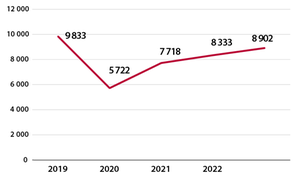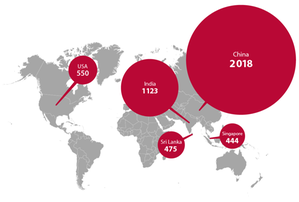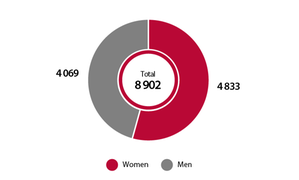The Swedish Migration Agency answers: how a residence permit for studies work
In recent years, the number of people from other countries who want to study in Sweden has increased. Which countries are the students from? And how long do they have to wait for a decision on a residence permit? In this article, we explain what applies to those who want to study higher education in Sweden.
Anyone who comes from a country outside the EU/EEA and wants to study in Sweden for more than three months needs to apply for a residence permit for that. The permit must be issued before you enter the country.
Nearly 21,000 people were granted residence permits for studies in 2023. Nearly three-quarters, or around 14,000, of them were permits for higher education studies. The others concerned studies at other levels, as well as residence permits for accompanying family members of students.
Since higher education studies account for the largest part of residence permits in the category of studies, this article focuses on that.
Increase in foreign students since the pandemic
Last year, approximately 8,900 people were granted a first-time residence permit for higher education studies*. This is more than in 2022 and 2021, and an increase of over fifty percent compared to 2020. That year, the number of permits granted dropped significantly as a result of the pandemic. In 2019, the number of residence permits granted was just over 9,800 – around 900 more than in the previous year.
 Zoom image
Zoom imageThe number of granted residence permits for studies in higher education 2019–2023.
 Zoom image
Zoom imageThe top five nationalities of those granted residence permits for higher education studies in 2023.
 Zoom image
Zoom imageThe number of women and men respectively who were granted a residence permit for studies in higher education in 2023.
China was the most common citizenship among those granted permits in 2023, followed by India. This was followed by the United States, Sri Lanka and Singapore. Nearly 54 percent of those who were granted residence permits were women and almost 46 percent men.
More than 2,500 people were granted residence permits as accompanying family members of students last year. This is less than in 2022, when 2,913 people were granted such a residence permit.
Requirements for obtaining a residence permit
The rules for studying in Sweden vary depending on whether you come from a country within the EU/EEA, or from another country in Europe or the world. These are people from countries outside the EU/EEA who need to apply for a residence permit to study in Sweden.
In order to be granted a residence permit for studies in higher education, you must have been admitted to a programme or course at a university or college in Sweden, and the education must require physical presence. The studies should, as a general rule, be full-time.
The applicant must also have paid the tuition fees that apply to citizens of countries outside the EU/EEA. In addition, you must be able to support yourself during the period of validity of your residence permit.
EU citizens do not need a residence permit
Citizens of countries within the EU/EEA have a so-called right of residence in Sweden. This means that they do not need a residence permit to study here, nor do they pay any fees for their studies.
As an EU/EEA citizen, you have the right to start studying immediately after arriving in Sweden and do not need to contact the Swedish Migration Agency. Upon entry into the country, a valid passport or identity card showing one's citizenship is required. To register here and obtain a Swedish personal identity number, the student needs to contact the Swedish Tax Agency.
How long is the processing time?
The majority of foreign students who apply for a residence permit for higher education studies receive their permits before the start of the semester. According to the regulations, the Swedish Migration Agency must process this type of case within 90 days of the application being received. In 2023, the average processing time for first-time applications for residence permits for first-cycle and second-cycle higher education studies was 64 days.
However, the length of the processing time varies. It depends, among other things, on how much the Swedish Migration Agency needs to investigate the case and whether additional information is needed.
Although the Swedish Migration Agency strives to ensure that all students receive their decisions on time, the agency may not be able to make a decision before the semester begins. In some cases, the student can, in agreement with the university, start their studies a little bit later, but there is also the risk that they will lose their study place. To minimise this risk, the Swedish Migration Agency has produced a guide with tips that increase the chance of a decision before the start of the semester, such as ensuring that you have gathered all the documents needed.
How to prevent abuse of residence permits
The Swedish Migration Agency has discovered that there is abuse of residence permits for studies, among other things in a report from 2022. In order to counteract the abuse, in-depth investigations are carried out on applications where there are indications that the applicant does not intend to study in Sweden. These in-depth checks have increased in number, and may result in a slightly longer processing time for certain programmes.
The Swedish Migration Agency and the Association of Swedish Higher Education Institutions (SUHF) have also, individually or together, implemented or submitted proposals for several measures to counteract the abuse of residence permits. These include increased language requirements, the development of the assessment of study intentions and the establishment of a common model for all higher education institutions for reporting non-completion of studies.
Working during your studies
In Sweden, unlike in many other EU countries, there is no upper limit for how much a foreign student is allowed to work alongside his or her studies. Students can also, after they have taken 30 credits, or completed one semester of study, apply for a work permit without having to leave Sweden. In 2023, approximately 1,700 former students were granted work permits.
After graduation
.png) Zoom image
Zoom imageThe number of granted residence permits to look for work after studies 2019–2023.
A person who has studied a higher education in Sweden can, after completing their studies, apply for a residence permit to look for work or start their own business here. In 2023, approximately 1,300 people were granted such a residence permit.
It is also possible to apply for a residence permit for doctoral studies if you are going to study at doctoral level for a period longer than three months. Residence permits for doctoral studies are granted for up to four years at a time.
The main rule is that the permit must be applied for and granted before coming to Sweden. A person who already has a residence permit and intends to continue studying after the permit expires can apply for an extension. You do not need to leave Sweden to apply, as long as the application is submitted before the previous permit expires.
*Refers to studies at undergraduate and graduate levels (not doctoral studies)